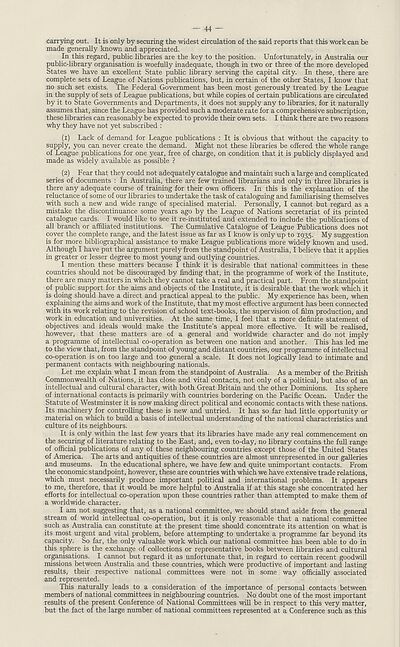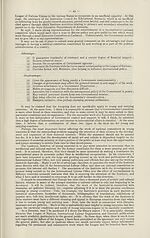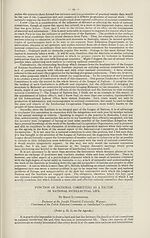International > Proceedings of the second General conference of national committees on intellectual co-operation, Paris, July 5th-9th, 1937
(46)
Download files
Complete book:
Individual page:
Thumbnail gallery: Grid view | List view

— 44 —
carrying out. It is only by securing the widest circulation of the said reports that this work can be
made generally known and appreciated.
In this regard, public libraries are the key to the position. Unfortunately, in Australia our
public-library organisation is woefully inadequate, though in two or three of the more developed
States we have an excellent State public library serving the capital city. In these, there are
complete sets of League of Nations publications, but, in certain of the other States, I know that
no such set exists. The Federal Government has been most generously treated by the League
in the supply of sets of League publications, but while copies of certain publications are circulated
by it to State Governments and Departments, it does not supply any to libraries, for it naturally
assumes that, since the League has provided such a moderate rate for a comprehensive subscription,
these libraries can reasonably be expected to provide their own sets. I think there are two reasons
why they have not yet subscribed :
(1) Lack of demand for League publications : It is obvious that without the capacity to
supply, you can never create the demand. Might not these libraries be offered the whole range
of League publications for one year, free of charge, on condition that it is publicly displayed and
made as widely available as possible ?
(2) Fear that they could not adequately catalogue and maintain such a large and complicated
series of documents : In Australia, there are few trained librarians and only in three libraries is
there any adequate course of training for their own officers. In this is the explanation of the
reluctance of some of our libraries to undertake the task of cataloguing and familiarising themselves
with such a new and wide range of specialised material. Personally, I cannot but regard as a
mistake the discontinuance some years ago by the League of Nations secretariat of its printed
catalogue cards. I would like to see it re-instituted and extended to include the publications of
all branch or affiliated institutions. The Cumulative Catalogue of League Publications does not
cover the complete range, and the latest issue as far as I know is only up to 1935. My suggestion
is for more bibliographical assistance to make League publications more widely known and used.
Although I have put the argument purely from the standpoint of Australia, I believe that it applies
in greater or lesser degree to most young and outlying countries.
I mention these matters because I think it is desirable that national committees in these
countries should not be discouraged by finding that, in the programme of work of the Institute,
there are many matters in which they cannot take a real and practical part. From the standpoint
of public support for the aims and objects of the Institute, it is desirable that the work which it
is doing should have a direct and practical appeal to the public. My experience has been, when
explaining the aims and work of the Institute, that my most effective argument has been connected
with its work relating to the revision of school text-books, the supervision of film production, and
work in education and universities. At the same time, I feel that a more definite statement of
objectives and ideals would make the Institute’s appeal more effective. It will be realised,
however, that these matters are of a general and worldwide character and do not imply
a programme of intellectual co-operation as between one nation and another. This has led me
to the view that, from the standpoint of young and distant countries, our programme of intellectual
co-operation is on too large and too general a scale. It does not logically lead to intimate and
permanent contacts with neighbouring nationals.
Let me explain what I mean from the standpoint of Australia. As a member of the British
Commonwealth of Nations, it has close and vital contacts, not only of a political, but also of an
intellectual and cultural character, with both Great Britain and the other Dominions. Its sphere
of international contacts is primarily with countries bordering on the Pacific Ocean. Under the
Statute of Westminster it is now making direct political and economic contacts with these nations.
Its machinery for controlling these is new and untried. It has so far had little opportunity or
material on which to build a basis of intellectual understanding of the national characteristics and
culture of its neighbours.
It is only within the last few years that its libraries have made any real commencement on
the securing of literature relating to the East, and, even to-day, no library contains the full range
of official publications of any of these neighbouring countries except those of the United States
of America. The arts and antiquities of these countries are almost unrepresented in our galleries
and museums. In the educational sphere, we have few and quite unimportant contacts. From
the economic standpoint, however, these are countries with which we have extensive trade relations,
which must necessarily produce important political and international problems. It appears
to me, therefore, that it would be more helpful to Australia if at this stage she concentrated her
efforts for intellectual co-operation upon these countries rather than attempted to make them of
a worldwide character.
I am not suggesting that, as a national committee, we should stand aside from the general
stream of world intellectual co-operation, but it is only reasonable that a national committee
such as Australia can constitute at the present time should concentrate its attention on what is
its most urgent and vital problem, before attempting to undertake a programme far beyond its
capacity. So far, the only valuable work which our national committee has been able to do in
this sphere is the exchange of collections or representative books between libraries and cultural
organisations. I cannot but regard it as unfortunate that, in regard to certain recent goodwill
missions between Australia and these countries, which were productive of important and lasting
results, their respective national committees were not in some way officially associated
and represented.
This naturally leads to a consideration of the importance of personal contacts between
members of national committees in neighbouring countries. No doubt one of the most important
results of the present Conference of National Committees will be in respect to this very matter,
but the fact of the large number of national committees represented at a Conference such as this
carrying out. It is only by securing the widest circulation of the said reports that this work can be
made generally known and appreciated.
In this regard, public libraries are the key to the position. Unfortunately, in Australia our
public-library organisation is woefully inadequate, though in two or three of the more developed
States we have an excellent State public library serving the capital city. In these, there are
complete sets of League of Nations publications, but, in certain of the other States, I know that
no such set exists. The Federal Government has been most generously treated by the League
in the supply of sets of League publications, but while copies of certain publications are circulated
by it to State Governments and Departments, it does not supply any to libraries, for it naturally
assumes that, since the League has provided such a moderate rate for a comprehensive subscription,
these libraries can reasonably be expected to provide their own sets. I think there are two reasons
why they have not yet subscribed :
(1) Lack of demand for League publications : It is obvious that without the capacity to
supply, you can never create the demand. Might not these libraries be offered the whole range
of League publications for one year, free of charge, on condition that it is publicly displayed and
made as widely available as possible ?
(2) Fear that they could not adequately catalogue and maintain such a large and complicated
series of documents : In Australia, there are few trained librarians and only in three libraries is
there any adequate course of training for their own officers. In this is the explanation of the
reluctance of some of our libraries to undertake the task of cataloguing and familiarising themselves
with such a new and wide range of specialised material. Personally, I cannot but regard as a
mistake the discontinuance some years ago by the League of Nations secretariat of its printed
catalogue cards. I would like to see it re-instituted and extended to include the publications of
all branch or affiliated institutions. The Cumulative Catalogue of League Publications does not
cover the complete range, and the latest issue as far as I know is only up to 1935. My suggestion
is for more bibliographical assistance to make League publications more widely known and used.
Although I have put the argument purely from the standpoint of Australia, I believe that it applies
in greater or lesser degree to most young and outlying countries.
I mention these matters because I think it is desirable that national committees in these
countries should not be discouraged by finding that, in the programme of work of the Institute,
there are many matters in which they cannot take a real and practical part. From the standpoint
of public support for the aims and objects of the Institute, it is desirable that the work which it
is doing should have a direct and practical appeal to the public. My experience has been, when
explaining the aims and work of the Institute, that my most effective argument has been connected
with its work relating to the revision of school text-books, the supervision of film production, and
work in education and universities. At the same time, I feel that a more definite statement of
objectives and ideals would make the Institute’s appeal more effective. It will be realised,
however, that these matters are of a general and worldwide character and do not imply
a programme of intellectual co-operation as between one nation and another. This has led me
to the view that, from the standpoint of young and distant countries, our programme of intellectual
co-operation is on too large and too general a scale. It does not logically lead to intimate and
permanent contacts with neighbouring nationals.
Let me explain what I mean from the standpoint of Australia. As a member of the British
Commonwealth of Nations, it has close and vital contacts, not only of a political, but also of an
intellectual and cultural character, with both Great Britain and the other Dominions. Its sphere
of international contacts is primarily with countries bordering on the Pacific Ocean. Under the
Statute of Westminster it is now making direct political and economic contacts with these nations.
Its machinery for controlling these is new and untried. It has so far had little opportunity or
material on which to build a basis of intellectual understanding of the national characteristics and
culture of its neighbours.
It is only within the last few years that its libraries have made any real commencement on
the securing of literature relating to the East, and, even to-day, no library contains the full range
of official publications of any of these neighbouring countries except those of the United States
of America. The arts and antiquities of these countries are almost unrepresented in our galleries
and museums. In the educational sphere, we have few and quite unimportant contacts. From
the economic standpoint, however, these are countries with which we have extensive trade relations,
which must necessarily produce important political and international problems. It appears
to me, therefore, that it would be more helpful to Australia if at this stage she concentrated her
efforts for intellectual co-operation upon these countries rather than attempted to make them of
a worldwide character.
I am not suggesting that, as a national committee, we should stand aside from the general
stream of world intellectual co-operation, but it is only reasonable that a national committee
such as Australia can constitute at the present time should concentrate its attention on what is
its most urgent and vital problem, before attempting to undertake a programme far beyond its
capacity. So far, the only valuable work which our national committee has been able to do in
this sphere is the exchange of collections or representative books between libraries and cultural
organisations. I cannot but regard it as unfortunate that, in regard to certain recent goodwill
missions between Australia and these countries, which were productive of important and lasting
results, their respective national committees were not in some way officially associated
and represented.
This naturally leads to a consideration of the importance of personal contacts between
members of national committees in neighbouring countries. No doubt one of the most important
results of the present Conference of National Committees will be in respect to this very matter,
but the fact of the large number of national committees represented at a Conference such as this
Set display mode to:
![]() Universal Viewer |
Universal Viewer | ![]() Mirador |
Large image | Transcription
Mirador |
Large image | Transcription
Images and transcriptions on this page, including medium image downloads, may be used under the Creative Commons Attribution 4.0 International Licence unless otherwise stated. ![]()
| League of Nations > International > Proceedings of the second General conference of national committees on intellectual co-operation, Paris, July 5th-9th, 1937 > (46) |
|---|
| Permanent URL | https://digital.nls.uk/195217773 |
|---|
| Shelfmark | LN.XII |
|---|
| Description | Over 1,200 documents from the non-political organs of the League of Nations that dealt with health, disarmament, economic and financial matters for the duration of the League (1919-1945). Also online are statistical bulletins, essential facts, and an overview of the League by the first Secretary General, Sir Eric Drummond. These items are part of the Official Publications collection at the National Library of Scotland. |
|---|---|
| Additional NLS resources: |
|

